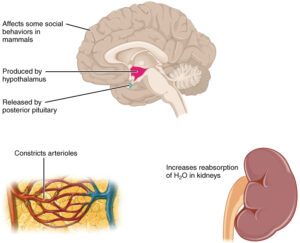Antidiuretic hormone
antidiuretic hormone (ADH) Also known as vasopressin. ADH is a nine-amino acid peptide secreted from the posterior pituitary gland. The hormone is packaged in secretory vesicles with a carrier protein called neuro- physin within hypothalamic neurons, and both are released upon hormone secretion. The single most important effect of antidiuretic hormone is to conserve body water by reducing the output of urine. It binds to receptors in the distal or collecting tubules of the kidney and promotes reabsorption of water back into the circulation.
The release of ADH is based on plasma osmolarity. The concentration of solutes in the blood. For example, loss of water (e.g., sweating) results in a concentration of blood solutes. So plasma osmolarity increases. osmoreceptors, neurons in the hypothalamus, stimulate secretion from the neurons that produce ADH. If the plasma osmolarity falls below a certain threshold, the osmoreceptors do nothing and no ADH is released. However, when osmolarity increases above the threshold, the osmoreceptors stimulate the neurons and ADH is released.





